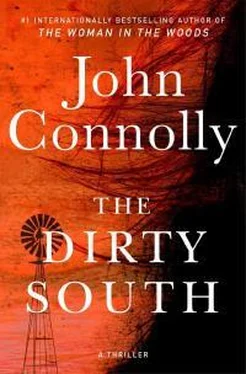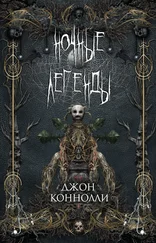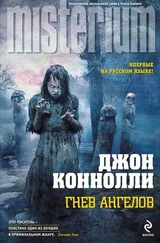‘Did you tell Hollis that before he started hurting her?’
Nealus laughed. ‘No, I didn’t want to spoil the fun.’
While he was talking, Maryanne McCullough had resumed banging against the roof of the trunk. Kel Knight walked to the front of the car and popped the trunk with the lever. He removed the gag from the girl’s mouth and told her to stay where she was for now before resuming his position.
‘Nealus,’ said Griffin, ‘I need you to get rid of the knife.’
Nealus reached to the back of his belt and removed the blade from its scabbard. It was about four inches long and shone dully in the sunlight.
‘Would it be better if there was a trial?’ he mused. ‘If I plead guilty, it’ll go straight to sentencing, but that might be too quick. If I were to plead not guilty at first, then it would all last so much longer, and I could always change my mind when it became tedious. I’d like to give evidence. Will they let me do that? Can I speak in my own defense? Will I be permitted to explain why I had to do what I did?’
‘I’m sure you’ll have the very best lawyers,’ said Griffin. ‘They’ll act as you instruct.’
‘Well, they sound like the very worst lawyers,’ said Nealus. ‘I don’t suppose it matters, though. I’ve ruined my father and my family. I’ve destroyed this land, and everyone in it. It’ll stay poor until the world turns to ash, and all of you will stay poor with it. Take a look at that sign over there, because it’s as close to escaping poverty as any of you will ever get – except Mr Parker, and he’s got bigger fish to fry.’
Nealus Cade cast the knife aside. Its purpose was ended.
‘I hope you find the one who killed your wife and daughter, Mr Parker, I really do,’ he said. ‘I have nothing against you. You’ve done me a favor by bearing witness. Your testimony will be the final nail in the coffin of this county.’
Evan Griffin knew he was right. Nealus had damned Burdon for eternity and impoverished thousands both in and beyond it, men and women who had caused him no harm. He had killed at least four people, and was set to kill a fifth when he was stopped. Nealus Cade was a monster, but one not entirely of his own creation. Even now, Griffin felt a semblance of compassion for him, but Griffin’s greater sorrow was for those whom he had sworn to serve. He had failed them, failed them all.
Griffin advanced, moving in from the right so the men behind him could keep Nealus in sight. He lowered his weapon and reached for his cuffs.
‘Get down on your knees,’ he said.
Nealus began to drop down.
And a single shot rang out.
99
Evan Griffin stood on the raised bank of the Karagol, staring at Nealus Cade’s body floating in the blackness of the lake. Griffin had not looked back after hearing the shot. He did not want to know the identity of the man responsible. He had endured enough disappointments, enough sorrows, and would accumulate more in time.
Anyway, he was about to commit a crime of his own.
He descended to the shore, where he began to gather stones. Kel Knight joined him, then Parker, and finally the third man, the one whose name Griffin did not yet know.
Together they weighed down the body of Nealus Cade and gave it to the Karagol.
100
Parker drove with Evan Griffin to the house of Pappy Cade, their trousers still damp from the lake, but Parker did not enter, and whatever passed between Griffin and Cade remained private. By then, Nealus Cade’s car had already been set alight by the bank of the Karagol, and Kel Knight had visited Eddy Rauls to smooth out any bumps in the narrative that was under construction: a kind of cousin to truth, or what Thoreau once termed a ‘consistent expediency’.
Later, Parker would wonder at the efficiency of it all: an investigation that was smothered at birth; a single witness, Maryanne McCullough, who had not managed to get a good look at the man responsible for abducting her, and could recall only snatches of a conversation overheard by the banks of the Karagol, and what she thought might have been a gunshot; a figure reportedly seen fleeing into the Ouachita and a subsequent pursuit that yielded no results, because those were deep woods in which a man could lose himself, if he chose; the revelation that, theoretically, a great many people had access to the garage in which the bodies of Sallie Kernigan and Hollis Ward were discovered, because there were multiple copies of the keys, including some held as far afield as Little Rock; and the decision by the Cades’ tame judge to regard Parker’s entry into that same garage as an illegal search, making the discovery of the bodies inside fruit from a poisoned tree in evidentiary terms.
And hovering in the background, presences from the state legislature and beyond, all with a shared interest in wealth and silence, even as the disappearance of Nealus Cade became its own mystery, one that was linked to the deaths of young women only through whisper and conjecture, until a corpse was found deep in the Ouachita: a male in his late thirties, rotted beyond identification, with a rusted four-inch blade beside him, the same weapon believed to have been used in the killing of Donna Lee Kernigan and her mother, and perhaps others too, although who could say for sure? His body bore the marks of a dissolute life.
A drifter, a stranger found dead – or so it was whispered – by Jurel Cade in a gutter, and rendered fit for the purpose of providing a scapegoat.
Someone not of that place.
Two days after the death of Nealus Cade, Parker checked out of his room at the Lakeside Inn. A new clerk stood behind the desk. He appeared harried, and was unfamiliar with the running of a motel. Cleon was gone. He had gathered his belongings and departed in the company of the men named Angel and Louis. Eventually Cleon would find his way to Springfield, Vermont, where he would open a bed and breakfast with his partner, Erik, and design costumes for the Springfield Community Players.
Only Evan Griffin was present to see Parker leave. He paid Parker’s bill and walked him to his car. They shook hands, and a few words were exchanged.
‘Where will you go?’ said Griffin. ‘Back to New York?’
‘In time,’ said Parker. ‘First, Mississippi.’
‘Why there?’
‘Someone crucified a woman named Eliza Tarp in Belzoni, and crowned her with thorns.’
‘You of a mind to discover who that someone might be?’
‘I am.’
‘You be careful about making promises to the dead. They’ll hold you to them.’
‘I expect them to,’ said Parker.
And then he was gone.
NOW
101
Parker heard down the phone line the whispering of years.
‘So I thought you should know,’ said Evan Griffin. ‘About the body. The Karagol had started to flood and stank worse than usual. Someone over at the Kovas facility thought dredging might help, which is how the remains were found.’
‘Have they been identified?’
‘From dental records,’ said Griffin. ‘It’s Nealus Cade. It’s a curious thing, but he was in a state of semipreservation. Something to do with the temperature of the water, they’re saying, and maybe the strangeness of the Karagol. Jurel was there when they laid the body down on the shore, once they’d freed it from the mud. He’d spent a long time looking for his brother, but I think he suspected where Nealus was all along. He’s the county sheriff now, you know? Good one, too, or so they tell me. He’s the last sibling left. Delphia died of cervical cancer a few years ago. And Pappy – well, Delphia took care of Pappy in his final months. I’d like to believe her solicitude might have been a boon to him, but I’m disinclined to lie to myself. The neighbors said they could hear him screaming in the days before he passed away.’
Читать дальше












